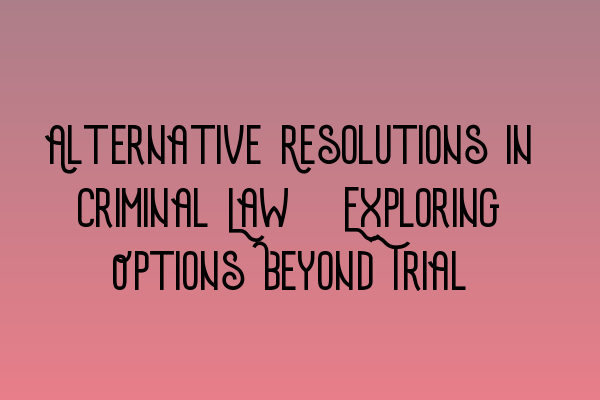Alternative Resolutions in Criminal Law: Exploring Options Beyond Trial
In the realm of criminal law, trials are often seen as the default method of resolving cases. However, there are alternative resolutions available that can provide benefits to both defendants and the criminal justice system as a whole. In this blog post, we will explore some of these options and highlight the advantages they offer.
1. Plea Bargaining
Plea bargaining is a common alternative resolution in criminal law, where the defendant agrees to plead guilty in exchange for a reduced sentence or other concessions. This process can help expedite the legal process and save significant resources for both the courts and defendants.
For more information on plea bargaining, you can read our related article here: SQE 1 Practice Mocks FLK1 FLK2.
2. Diversion Programs
Diversion programs provide an opportunity for defendants to avoid formal prosecution by completing alternative rehabilitation measures, such as education, community service, or treatment programs. This approach focuses on addressing the underlying issues that may have led to the criminal behavior.
If you’re interested in learning about diversion programs, you can check out our related article here: SQE 1 Practice Exam Questions.
3. Restorative Justice
Restorative justice emphasizes repairing the harm caused by the offense and promoting healing for all parties involved, including victims, offenders, and the community. This approach encourages communication and dialogue, allowing victims to have their voices heard while offenders take responsibility for their actions.
For more insights on restorative justice, feel free to explore our related article here: SQE 2 Preparation Courses.
4. Pre-Trial Diversion
Pre-trial diversion programs offer an alternative to traditional prosecution by allowing eligible defendants to complete specified conditions, such as counseling or community service, to have their charges dismissed. This option reduces the burden on the court system and offers individuals an opportunity to avoid a criminal record.
If you’re considering pre-trial diversion, our related article on SQE 1 preparation courses provides valuable information: SQE 1 Preparation Courses.
5. Sentencing Alternatives
Instead of imposing harsh sentences, the criminal justice system offers various alternatives such as probation, house arrest, or electronic monitoring. These options promote rehabilitation, reduce prison overcrowding, and allow individuals to continue their lives with certain restrictions.
If you would like to know more about sentencing alternatives, you can refer to our related article on SRA SQE exam dates here: SRA SQE Exam Dates.
By exploring these alternative resolutions and understanding their benefits, both defendants and the criminal justice system can achieve a more efficient and effective process. If you have any questions or would like to learn more about criminal law, please feel free to contact us.
